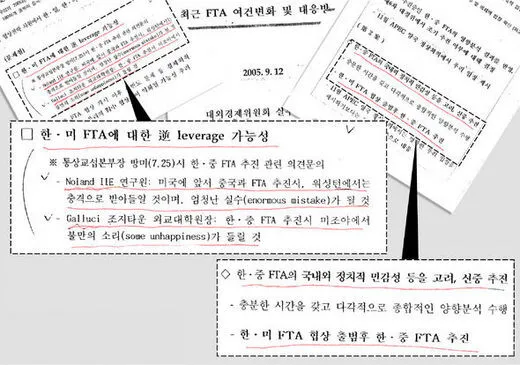hankyoreh
Links to other country sites 다른 나라 사이트 링크
[Exclusive] S.K. nixed trade deal with China under U.S. pressure, data reveals

According to data from the "5th International Economic Committee Agenda" meeting held on September 12, 2005, the Chinese government made the request that "in order to notably expand China-South Korea economic and commercial cooperation, the two nations should sign a bilateral free trade agreement [FTA]. As South Korea has not clarified its position, we are waiting for South Korea’s clear response."
The International Economic Committee is presided over by the president or deputy prime minister and discusses foreign economic strategies, such as FTAs; related ministers take part in the committee. The written data were revealed by Sim Sang-jeung of the Democratic Labor Party (DLP) on August 9 this year.
Prior to making a decision to start South Korea-U.S. FTA negotiations, China suggested to South Korea the idea of an FTA between the two nations, offering the unprecedented condition that it would make concessions on the issue of farm products - as China’s agricultural sector is extremely strong, South Korea feared the effects of such an FTA.
In August 2005, Li Shaozun, China’s deputy commerce minister, sent the message to Seoul that Beijing would make a significant concession about farm products, saying that China would "show flexibility for sensitive items such as rice," according to the data.
The South Korean government has put China on the top of a list of nations with which the government would have FTA negotiations, as at least until the end of 2004 Seoul thought an FTA with Beijing would bring bigger economic benefit as compared to a deal with Tokyo or Washington.
However, negotiations with China were never realized; instead, the South Korean government went on to consider an FTA with the United States, accepting several controversial preconditions such as lifting a ban on U.S. beef products.
The data also showed that the government sent Trade Minister Kim Hyun-jong to Washington to find out the U.S. reaction to China’s suggestion, at which point the U.S. raised serious concerns. At the time, Marcus Norland, a senior researcher of the U.S. Institute for International Economics, said that "if South Korea pushes ahead an FTA with China prior to signing an agreement with the U.S., Washington will be shocked. It will be a big mistake."
Prof. Robert Galucci of George Washington University, who was the American chief delegate for 1994 Geneva Agreed Framework, at the time also warned of dissent from Washington should such an agreement be signed with China first.
The government, in consideration of China’s suggestion and the U.S. reaction, discussed two plans, the data said.
One scenario was to have earlier negotiations with China and the other was to negotiate with China after signing an FTA with the U.S. Taking into account the fact that President Roh Moo-hyun and his U.S. counterpart George Bush reportedly agreed to start FTA negotiations during a summit in Gyeongju on November 17 last year, shortly before the Asia Pacific Economic Cooperation (APEC) summit, the government might have decided to proceed with an FTA with Washington instead of an FTA with Beijing, following the September committee meeting last year.
The government officially declared the start of Korea-U.S. FTA negotiations in February.
Rep. Sim said, "While China [offered to open doors for] Korea while competing for leadership in East Asia, the U.S. seems to have held China back. It is a problem that the U.S. raised an objection, almost threatening Korea, and I don’t understand why the government started negotiations with the U.S., accepting the four preconditions."
In response, an official from the office of international trade negotiation under the Ministry of Foreign Affairs and Trade said, "It is true that China approached us last year, but we didn’t accept their offer because we thought our agricultural sector would be seriously affected by an FTA with China."
Editorial・opinion
![[Editorial] Asia Future Forum brings bright minds together to explore democracy’s future [Editorial] Asia Future Forum brings bright minds together to explore democracy’s future](https://flexible.img.hani.co.kr/flexible/normal/500/300/imgdb/original/2025/1024/1317612945603513.jpg) [Editorial] Asia Future Forum brings bright minds together to explore democracy’s future
[Editorial] Asia Future Forum brings bright minds together to explore democracy’s future![[Column] Russia and China’s golden ticket to destabilizing the dollar [Column] Russia and China’s golden ticket to destabilizing the dollar](https://flexible.img.hani.co.kr/flexible/normal/500/300/imgdb/original/2025/1023/2117612083961121.jpg) [Column] Russia and China’s golden ticket to destabilizing the dollar
[Column] Russia and China’s golden ticket to destabilizing the dollar- [Correspondent’s column] Martial law comes for the United States
- [Column] The end of the road for NewJeans, or a new beginning?
- [Editorial] Korea must prepare for rough road ahead with Japan
- [Editorial] Korea cannot afford to rush to a deal with the US
- [Column] Shared dilemmas at a historic turning point for Korea, Europe
- [Column] Halfway across the world, I’m cheering on Americans fighting for democracy
- [Column] How meritocracy turns into tyranny
- [Column] The real scandal of Korea’s ‘divorce of the century’
Most viewed articles
- 1Korea allows same-sex couples to check ‘spouse’ box on census for first time
- 2Record visitors bring National Museum of Korea into world top 5 art museum territory
- 3Real-life heroes of “A Taxi Driver” pass away without having reunited
- 4Lee says US tariff deal may not be finalized by next week’s APEC summit
- 5Despite stellar performance, BTS leaves Grammys empty-handed again
- 6North Korea asserts its presence before Trump arrives in South Korea
- 7Korea’s response to martial law crisis a model of 3 strategies for defending democracy, says Levitsk
- 8Korea, US will soon start negotiations on revising nuclear energy pact, says FM
- 9[Correspondent’s column] Martial law comes for the United States
- 10[Photo] Incheon Inner Harbor silo reborn as mural